Other
- a vague term Donald Trump has used in many tweets, see Donald Trump on social media#Insults
So Sad may refer to:
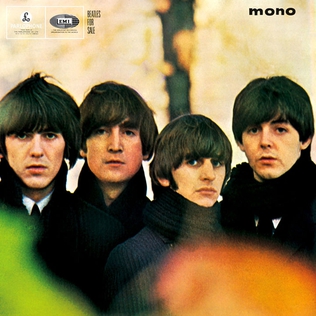
Beatles for Sale is the fourth studio album by the English rock band the Beatles. It was released on 4 December 1964 in the United Kingdom on EMI's Parlophone label. The album marked a departure from the upbeat tone that had characterised the Beatles' previous work, partly due to the band's exhaustion after a series of tours that had established them as a worldwide phenomenon in 1964. Beatles for Sale was not widely available in the US until 1987, when the Beatles' catalogue was standardised for release on CD. Instead, eight of the album's fourteen tracks appeared on Capitol Records' concurrent release, Beatles '65, issued in North America only.

The Beatles, also known as the White Album, is the ninth studio album and only double album by English rock band the Beatles, released on 22 November 1968. Its plain white sleeve contains no graphics or text other than the band's name embossed, which was intended as a direct contrast to the vivid cover artwork of the band's previous LP Sgt. Pepper's Lonely Hearts Club Band. The Beatles is recognised for its fragmentary style and diverse range of genres, including folk, British blues, ska, music hall and the avant-garde. It has since been viewed by some critics as a postmodern work, as well as among the greatest albums of all time.

"Yesterday" is a song by the English band the Beatles, written by Paul McCartney and credited to Lennon–McCartney. It was first released on the album Help! in August 1965, except in the United States, where it was issued as a single in September. The song reached number one on the US charts. It subsequently appeared on the UK EP Yesterday in March 1966 and made its US album debut on Yesterday and Today, in June 1966.

"Something" is a song by the English rock band the Beatles from their 1969 album Abbey Road. It was written by George Harrison, the band's lead guitarist. Together with his second contribution to Abbey Road, "Here Comes the Sun", it is widely viewed by music historians as having marked Harrison's ascendancy as a composer to the level of the Beatles' principal songwriters, John Lennon and Paul McCartney. Two weeks after the album's release, the song was issued on a double A-side single, coupled with "Come Together", making it the first Harrison composition to become a Beatles A-side. The pairing was also the first time in the United Kingdom that the Beatles issued a single containing tracks already available on an album. While the single's commercial performance was lessened by this, it topped the Billboard Hot 100 in the United States as well as charts in Australia, Canada, New Zealand and West Germany, and peaked at number 4 in the UK.
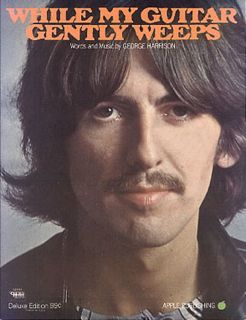
"While My Guitar Gently Weeps" is a song by the English rock band the Beatles from their 1968 double album The Beatles. It was written by George Harrison, the band's lead guitarist. The song serves as a comment on the disharmony within the Beatles following their return from studying Transcendental Meditation in India in early 1968. This lack of camaraderie was reflected in the band's initial apathy towards the composition, which Harrison countered by inviting his friend and occasional collaborator, Eric Clapton, to contribute to the recording. Clapton overdubbed a lead guitar part, although he was not formally credited for his contribution.

Abbey Road is the eleventh studio album by the English rock band the Beatles, released on 26 September 1969 by Apple Records. Named after the location of EMI Studios in London, the cover features the group walking across the street's zebra crossing, an image that became one of the most famous and imitated in popular music. The album's initially mixed reviews were contrasted by its immediate commercial success, topping record charts in the UK and US. The lead single "Something" / "Come Together" was released in October and topped the US charts.

Dark Horse is the fifth studio album by English rock musician George Harrison. It was released on Apple Records in December 1974 as the follow-up to Living in the Material World. Although keenly anticipated on release, Dark Horse is associated with the controversial North American tour that Harrison staged with Indian classical musician Ravi Shankar in November and December that year. This was the first US tour by a member of the Beatles since 1966, and the public's nostalgia for the band, together with Harrison contracting laryngitis during rehearsals and choosing to feature Shankar so heavily in the programme, resulted in scathing concert reviews from some influential music critics.

"All You Need Is Love" is a song by the English rock band the Beatles that was released as a non-album single in July 1967. It was written by John Lennon and credited to the Lennon–McCartney partnership. The song was Britain's contribution to Our World, the first live global television link, for which the band were filmed performing it at EMI Studios in London on 25 June. The programme was broadcast via satellite and seen by an audience of over 400 million in 25 countries. Lennon's lyrics were deliberately simplistic, to allow for the show's international audience, and captured the utopian ideals associated with the Summer of Love. The single topped sales charts in Britain, the United States and many other countries, and became an anthem for the counterculture's embrace of flower power philosophy.

"Here Comes the Sun" is a song by the English rock band the Beatles from their 1969 album Abbey Road. It was written by George Harrison and is one of his best-known compositions. Harrison wrote the song in early 1969 at the country house of his friend Eric Clapton, where Harrison had chosen to play truant for the day to avoid attending a meeting at the Beatles' Apple Corps organisation. The lyrics reflect his relief at the arrival of spring and the temporary respite he was experiencing from the band's business affairs. As of September 2019, it was the most streamed Beatles song on Spotify globally.
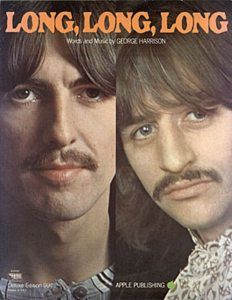
"Long, Long, Long" is a song by the English rock band the Beatles from their 1968 album The Beatles. It was written by George Harrison, the group's lead guitarist, while he and his bandmates were attending Maharishi Mahesh Yogi's Transcendental Meditation course in Rishikesh, India, in early 1968. Although Harrison later stated that he was addressing God in the lyrics, it is the first of his compositions that invites interpretation as both a standard love song and a paean to his deity.
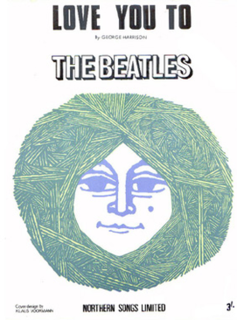
"Love You To" is a song by the English rock band the Beatles from their 1966 album Revolver. The song was written and sung by George Harrison and features Indian instrumentation such as sitar and tabla. Following Harrison's introduction of the sitar on "Norwegian Wood " in 1965, it was the first Beatles song to fully reflect the influence of Indian classical music. The recording was made with minimal participation from Harrison's bandmates; instead, he created the track with tabla player Anil Bhagwat and other Indian musicians from the Asian Music Circle in London.
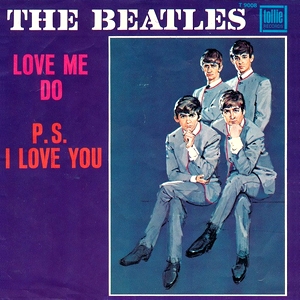
"P.S. I Love You" is a song recorded by English rock band the Beatles in 1962. It was composed principally by Paul McCartney, and produced by Ron Richards. The song was released in the UK on 5 October 1962 as the B-side of their debut single "Love Me Do" and is also included on their debut album Please Please Me (1963). It was later included on the American release Introducing... The Beatles (1964), its reissue The Early Beatles (1965), and the Beatles compilation album Love Songs (1977).

"You Can't Always Get What You Want" is a song by the English rock band the Rolling Stones on their 1969 album Let It Bleed. Written by Mick Jagger and Keith Richards, it was named as the 100th greatest song of all time by Rolling Stone magazine in its 2004 list of the "500 Greatest Songs of All Time" before dropping a place the following year.

Yellow Submarine is the tenth studio album by English rock band the Beatles, released on 13 January 1969 in the United States and on 17 January in the United Kingdom. It was issued as the soundtrack to the animated film of the same name, which premiered in London in July 1968. The album contains six songs by the Beatles, including four new songs and the previously released "Yellow Submarine" and "All You Need Is Love". The remainder of the album is a re-recording of the film's orchestral soundtrack by the band's producer, George Martin.

"Caroline, No" is a song by American musician Brian Wilson that was released as his debut solo record on March 7, 1966. Written with Tony Asher, the lyrics describe a disillusioned man who reflects on his aged, former love interest and the loss of her innocence. Musically, it is distinguished for its jazz chords and unusual combination of instruments, including bass flutes, 12-string electric guitar, and muted harpsichord. It later appeared as the closing track on the Beach Boys' album Pet Sounds.
Sad Song may refer to different pieces of music:

Chrisette Michele Payne, known professionally as Chrisette Michele, is an American R&B and soul singer-songwriter. She won a Grammy Award for Best Urban/Alternative Performance in 2009 for her song "Be OK".
"So Sad" is a song by English rock musician George Harrison that was released on his 1974 album Dark Horse. Harrison originally recorded the song for his previous album, Living in the Material World, before giving it to Alvin Lee, the guitarist and singer with Ten Years After. Lee recorded it – as "So Sad " – with gospel singer Mylon LeFevre for their 1973 album On the Road to Freedom. The latter recording includes contributions from Harrison and marked the first of several collaborations between him and Lee.
Donald Trump served as the 45th president of the United States from 2017–2021, and is an American businessman and television personality.
Multiple songs, albums, bands and performances have referenced Donald Trump or his various brands, including Trump Tower, his TV show, his hotel chain, and his casinos. While recent songs refer to Trump's campaign, election, and tenure as President of the United States, more than 200 songs refer to Trump prior to his campaigns for president. Most earlier references to Trump in lyrics revolve around his status as a business tycoon, but then shifted toward a stance more critical of his politics as he attempted to attain public office. With his victory in the 2016 presidential election, Trump's prominence in hip-hop music has been likened to that of Ronald Reagan's in hardcore punk during the 1980s.